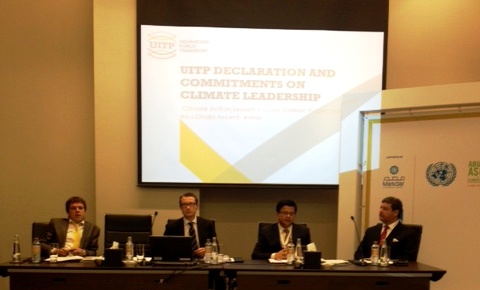In Abu Dhabi Ascent, representatives of private sector and the civil society organizations announced 31 initatives in 9 different high-impact areas. (See full list of initiatives) Transport was the second largest sector making 6 out of 31 initiatives in three areas: Transport, Energy Efficiency and Short-Lived Climate Pollutants. For more information on each transport initative, please see information page and interviews with initiative coordinators.
The SLoCaT Partnership blogged live from the Abu Dhabi Ascent on the discussions around the sustainable transport initiatives. We had three persons blogging: Cornie Huizenga (Secretary General of SLoCaT Partnership), Heather Allen (Sustainable Transport Director of Transport Research Laboratory), Michael Replogle (Managing Director Policy & Founder of Insitute for Transportation and Development Policy)



Cornie Huizenga Heather Allen Michael Replogle
Change is ‘carbon free’ air – General reflections from the Abu Dhabi Ascent- Heather Allen, Monday 5 May
An interesting choice of title for this ‘meeting of the willing’ in Abu Dhabi – the Abu Dhabi Ascent – especially when all talk was of ‘decent’ . Reduction of emissions, decreased use of fossil fuels, removal of subsidies, fewer this, less that…. all focussing on efforts to get the lines on the majority of the graphs presented to turn around and start going down. Transport terminology also abounded in all conversations on stage in plenary and in the corridors! Accelerator initiatives, vehicles for change, changing gear to mention a few of the phases that popped up all the time! It was gratifying to see that there was also space for transport itself at the meeting – with 3 direct commitments being launched and several other transport related ones under other clusters such as energy efficiency. When we talked transport we did not aviation or shipping much. No one from ICAO seemed to have bothered to attend – maybe as the majority of delegates had flown there, they felt no need as actions spoke louder than words! The hosts made every effort to make their support for low carbon, especially in terms of renewable energy clear. There was also a certain simplicity to their interventions and protocol was lower than I have seen in other events. This could be due to Ban ki Moon’s presence and own style. He also made it clear that he expected a consensus to be achieved in Paris and I sensed that at the end there was at least a better understanding that the world was not able to accept another Copenhagen failure. If this happened it would also undermine the UN itself and been seen as a key failure of the intergovernmental process. A crystal ball would be useful at this point in time as it is also difficult to untangle how governments can be practical but also ambitious and respond to the needs of business, government and business. We also know that if China, India, Russia, the US and Europe do not make this happen we might as well start looking for other planetary homes. Russia may have had other things on its mind but I did not hear the voices of China or India pledging their support for a successful outcome in Lima or Paris … mmmm. Maybe I should buy that spaceship.
Urban Electric Mobility Initiative – Cornie Huizenga, Monday 5 May
The break out session on the UEMI initiative developed by UN-Habitat had a lively discussion between participants representing UN, public sector, and a number of private sector representatives. Participants tried collectively to come to terms with the changes that are required in the way that they are using transport on a day to day basis. Very few are now using electric transport on a day to day basis.
The private sector, welcomes the UEMI initiative and the Action Platform announced at the Ascent Meeting and and indicated a willingness to join the initiative. The Action Platform will facilitate city projects, partnerships between cities and companies to increase urban electric mobility. It will also work with city and national governments to raise awareness on, and develop enabling policy and regulatory measures to increase sales of E-vehicles and promote investments in re-charging infrastructure.
It became clear from the discussion that urban electric mobility can not be pursued in isolation but that it needs to be integarted with energy planning as well as urban planning.
Some additional observations:
- the IEA has developed clear long term scenario’s on how electric mobility needs to be part of an integrated Avoid-Shift-Improve approach to reducing transport GHGs. IEA can help to provide a reporting and monitoring framework for the UEMI initiative. UITP through its regular tracking of public transport can help UEMI initiative in monitoring market penetration for electric mobility in public transport;
- Public transport is an area where rapid progress has been made in introducing electric mobility;
- Private sector feels that their technologies are ready for large scale adoption – they are actively thinking about financing models (e.g. leasing) to facilitate the introduction of electric mobility;
- Financing structures need to be part of the UEMI Action Platform;
- There is a need for more awareness raising on success stories on electric mobility;
- Charging infrastructure is especially a problem for light duty vehicles.
The Energy Efficiency Accelerator Platform Session– Heather Allen, Monday 5 May
The Energy Efficiency Accelerator Platform session was presided over by Mr Kandeh Yumkella, CEO of Sustainable Energy for All with a panel of representatives from various sectors, the business community and foundations – lighting, district heating, buildings, finance and transportation. Sheila Watson of the FIA Foundation, one of the leading organisations in the Global Fuel Economy Initiative (GFEI). The concept of an accelerator platform is interesting as it brings together a number of existing and new initiatives under a common goal. Sustainable transport could benefit from setting up a similar arrangement. The Government of Denmark has provided funding to create a clearing house that will bring together examples and good practice, and there are ambitions to have access to technical assistance and set up processes to monitor and report on progress. Transport is usually complex and difficult but in terms of improving energy efficiency – it relies on ‘simple’ policy implementation. The complexity kicks in if it is done in isolation – yet Europe has demonstrated that any rebound effect of lower fuel use does not automatically rebound into increased distances travelled. The descending In terms of energy efficiency in transport
Announcement on details of SG Ban Ki-moon’s Climate Summit – Cornie Huizenga, Monday May 5
Bob Orr or the SG’s office made announcement on details of the 23 September Climate Summit. Key elements will be:
- Plenary where Heads of State make announcements of future ambition and action through national efforts
- Action Platforms with announcements of multistakeholder action initiatives. To be based on the areas presented at the Ascent meeting. Transport is expected to be part of Transport, Cities, Energy Efficiency and Short Lived Climate Pollutants
- High level thematic policy discussions on Science, Economic Case for Action, Innovation, Co-benefits of Climate Action, and Livelihoods
A two way street for future of transport sector- Heather Allen, Saturday May 4
UITP representing the public transport sector and UIC the rail sector presented their own commitments to sustainable transport and climate change today. Doubling public transport mode share in urban areas across the world and working with the major operators across all modes, the service and supply industry and others via this commitment will make help to a demonstrate the mitigation potential of public transport. Linking this to the ambitious goal set by UIC for rail to shift trips from road to rail in both passenger and freight and to increase electrification of rail systems but also to work within the sector to improve performance, show that the transport community is fully behind efforts at international and national governmental level.
Break-out session: UIC and UITP Initiatives on Low Carbon Railways and Public Transport – Cornie Huizenga, Sunday May 4

At the Abu Dhabi Ascent, the international association of public transport (UITP) has invited its 1300 member organisations in 92 countries to show their leadership position on climate through its climate declaration and announce investor ready, verifiable and reportable commitments to be launched in at the Climate Summit in September to support the goal to double the market share of public transport by 2025.
The International Union of Railways (UIC), and their 240 member railway companies, stated their intention to achieve a substantive reduction in transport carbon emissions with proposed targets of a 75% reduction in specific emissions and doubling of modal shift to railways by 2050, supported by robust monitoring, verification & reporting.
Blair brings a sobering tone to Abu Dhabi- Heather Allen, Sunday May 4
Tony Blair, UK’s ex-Prime Minister, brought a sobering tone of reality to the discussions today in plenary. Ban Ki-moon urged leader to take action, stating ‘that the race is on – it’s time to lead’. Maybe re-thinking his time in office and the failure of the Copenhagen COP under his watch, Blair tempered his answers to Sir Trevor Macdonald in an interesting one-to-one interview held on stage. He used words like ‘best possible’; ‘sensible’;’ while making every effort’ – underpinning his words with practical suggestions that it is better to have a somewhat imperfect but workable agreement in Paris than an ambitious but not signed one. He also mentioned that in his experience being too bold or ambitious increase political risk and electoral dangers.
Transport Ascending in Climate Change Action – Michael Replogle, Sunday May 4
Transportation itself is ascending in attention in the global discussion of climate change solutions at the Abu Dhabi Ascent meeting organized by the UN Secretary General, 4-5 May 2014. Several hundred senior government and finance institution representatives, leaders of business and civil society, are meeting for two days to prepare voluntary commitments that might be announced at the UN Secretary General’s Climate Summit in New York on September 23, 2014.
In an opening high level plenary session on May 4thon cities and transportation as action areas, the President of UN Habitat, Joan Clos, noted that global urbanization is rapid and associated with higher levels of energy use and income. We need to get the pattern of urbanization right to achieve sustainable development, using integrated land use and transport strategies. If we build it wrong, it will remain wrong for a long time.
UN Deputy Secretary General Wu Hongbo noted that if transport is not sustainable, the world won’t be sustainable and average temperatures will rise by more than the 2 degree global target. We need to reduce the need for motor transport, shift to low carbon modes, and improve transport’s environmental performance. He announced the UN Secretary General is in process of appointing a High Level Panel on Sustainable Transport which will promote sustainable transport worldwide. Sustainable transport will cut dramatically the number of people who die prematurely due to air pollution and road crashes.
Peter Bakker, President of the World Business Council for Sustainable Development, said businesses need national policy frameworks to help cities rapidly take to scale effective city level transport solutions, whether in green freight, Bus Rapid Transit, or doubling fuel economy and public transport use.
Gunjan Parik of the C40 Cities noted that sustainable transport was being demonstrated by many cities at scale, e.g., with BRT and bike sharing, but more transformative policies supported by international finance available to cities are needed to ensure timely progress. Transport is a key enabler of development in all sectors.
The rapid growth of green bonds, which are supporting investments where there is transparency about environmental impacts and a pipeline of bankable projects, was noted by the World Bank’s Rachel Kyte, who pointed to large asset pools interested in such opportunities in the water, agriculture, energy, and transport sectors.
UN-DESA USG (Pre)announces UN Secretary General’s High Level Body on Sustainable Transport – Cornie Huizenga, Sunday 4 May
Mr. Wu Hongbo, the Undersecretary General of UN-DESA remarked that the preparations on the Secretary General’s High Level Advisory Group on Sustainable Transport are now well advanced. This High Level Group would also play an important role in ensuring the sustainability of the transport initiatives discussed at the Ascent meeting in preparation of the SG Climate Summit. It is encouraging to hear that UN-DESA is now sufficiently confident to refer to the imminent announcement of the High Level Advisory Body, which is expected to include several SLoCaT members.
More insights on financing – Cornie Huizenga, Sunday 4 May
The former President of Mexico Felipe Calderón, now the chair person of the Global Commission on the Economy and the Climate, in his key note address also talked extensively about financing of low carbon development. It is becoming increasingly clear that the debate on low carbon discussion is increasingly moving beyond the need on policy change (on which most people agree) to a discussion on how such new policies can be financed.
During lunch the topic of funding also came up the idea was born for two special SLoCaT events on funding sustainable, low carbon development. One as a side event to the July High-level Political Forumon Sustainable Development and one event in Europe possibly in June or July. UN-DESA, UN Habitat and the Climate Bonds Initiative have shown interest in part of this meeting. Ideally we should have a funding narrative for all the 6 transport initiatives prior to the Climate Summit in September.
Creating a pipe-line of transport climate bond funded projects – Cornie Huizenga, Sunday 4 May
At the moment we have a big problem because there is simply not enough mitigation and adaptation specific deal flow for Climate Bond organizers to invest in. Development Banks, for example, can’t meet their annual climate lending quotas. This also applies to transport. One of the questions asked by the Climate Bonds Initiative here in Abu Dhabi is whether it is possible to pull together is a (credible) patchwork quilt of likely investment opportunities around the world over the next 5-10 years. This can include new BRT systems in Asia, Africa and Latin America to financing of railway development. It is good to see such an active interest in private sector financing in low carbon transport in addition to the ODA funding (MDB $175 billion) lined up for more sustainable transport at the Rio+20 summit in 2012.
Al Gore firing up the Ascent participants – Cornie Huizenga, Sunday 4 May
Key note speaker, former Vice President Al Gore, showed his continued passion on climate change. It was clear that he had not lost any of his talents to make power point work for him, rather than against him. Drawing comparisons with the civil right struggle, his message was that the battle on climate change is one that can be and will be won. While he gave many energy related examples, there were none on sustainable transport. This is something that we will need to work on.
See here for video of Al Gore’s presentation.
Arrival in Abu Dhabi – Cornie Huizenga, Saturday 3 May
Arrived in Abu Dhabi for the Ascent meeting to prepare for the Climate Summit of Secretary General Ban Ki-moon. For the transport sector this is a key event. Never before has the mitigation potential of transport been showcased at such a senior level in the UN context. It is great to see SLoCaT members so actively engaged through initiatives on passenger and rail transport; passenger and freight transport; technological and behavioral change.
When discussing the event yesterday with representatives of UIC and UITP we agreed that the initiative of the Secretary General provides sectors like transport with the means to put forward a sectoral approach, which in the UNFCCC context so far has not been possible.
I will be tweeting throughout the event @slocatcornie using #transportascent.